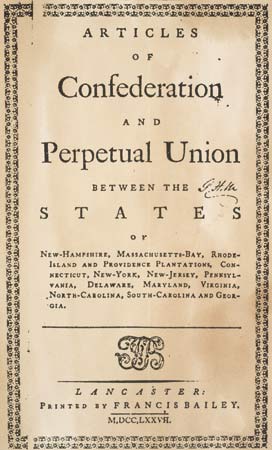New Article, New Project: The Articles of Confederation
 The editors of the Journal of Early American History have published my article "Trade, Diplomacy, and American Independence: Cuyler, Gansevoort & Co. and the Business of Trade During the Confederation Era" in their latest edition. I came across the papers of Cuyler, Gansevoort & Co. during my volunteer work at the Albany Institute of History and Art. In exchange for building a finding aid for the Ten Eyck/Gansevoort Papers (MG2), I had the opportunity to be the first scholar to look at the collection. I had hoped that the papers would contain information for my book project AMERICA'S FIRST GATEWAY: ALBANY, NEW YORK AND THE MAKING OF AMERICA, 1614-1830. Instead, the collection led me to my second book project: The Articles of Confederation.
The editors of the Journal of Early American History have published my article "Trade, Diplomacy, and American Independence: Cuyler, Gansevoort & Co. and the Business of Trade During the Confederation Era" in their latest edition. I came across the papers of Cuyler, Gansevoort & Co. during my volunteer work at the Albany Institute of History and Art. In exchange for building a finding aid for the Ten Eyck/Gansevoort Papers (MG2), I had the opportunity to be the first scholar to look at the collection. I had hoped that the papers would contain information for my book project AMERICA'S FIRST GATEWAY: ALBANY, NEW YORK AND THE MAKING OF AMERICA, 1614-1830. Instead, the collection led me to my second book project: The Articles of Confederation.
The Ten Eyck/Gansevoort collection contains many of the papers from Cuyler, Gansevoort & Co., an import-export firm that conducted business during the Confederation Era. The correspondence between Jacob Cuyler, Leonard Gansevoort, and their trading partners reveal the hope and perils of conducting domestic and foreign trade during the first years of American independence.
The idea for my second book project came as I wrote the historiography section, which I opted to place toward the end of the article as not to breakup the story of Cuyler, Gansevoort & Co. Few books discuss the Articles of Confederation on its own terms. Merrill Jensen wrote two books on the subject between 1940 and 1950. Since Jensen's work, scholars who discuss or investigate the Articles look upon the government as a stepping stone to the Constitution of 1787.
My future book will not claim the Articles of Confederation as a successful government. My article below uses a case study to discuss the diplomatic and economic weaknesses of the government. Instead, my book on the Articles will investigate the government and its making within the context of the American Revolution. I am sure it will take great interest in the regional debates surrounding the formation of the government because I am fascinated by the diversity of American culture and how the United States functions despite Americans' cultural differences.
Enjoy!